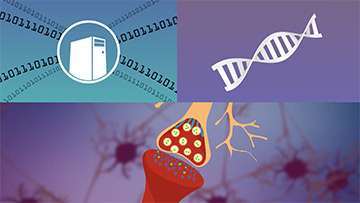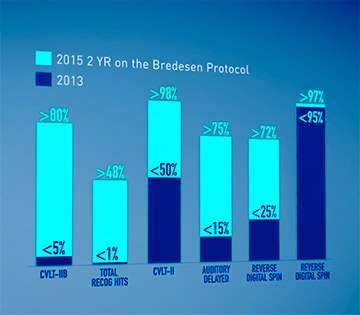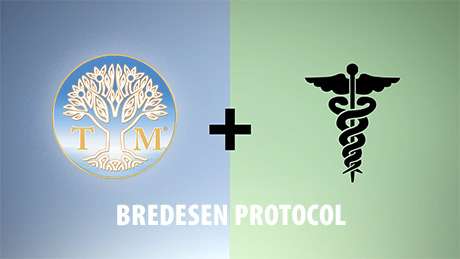Alzheimer’s disease is a frightening diagnosis for the patients and their loved ones. As the debilitating condition progresses, the person withers away both physically and mentally. Eventually the patient will need help with all everyday activities, lose their memory, ability to communicate and features of their personality.
Family members of an Alzheimer’s patient need not only deal with the physical and financial burden of caretaking but also with the emotional distress of losing many aspects of their loved one even before he or she dies.
Despite the billions of dollars that have been poured into research for an Alzheimer’s cure, only a single medication with modest effects has so far been approved for alleviating the condition. Until recently, no study offered much hope after the diagnosis was delivered.
A holistic approach to treating Alzheimer’s
To tackle the sixth leading cause of death in the United States, Dale Bredesen, M.D. decided to look at Alzheimer’s disease from a standpoint of integrative medicine. Instead of concentrating on a single lab value or a specific body part in isolation, he focused on the body as a wholistic system with individual differences.
A bestseller The End of Alzheimer’s: The First Program to Prevent and Reverse Cognitive Decline, and peer-reviewed pilot studies which demonstrate reversal of cognitive decline in patients with early-Alzheimer’s are the result of 30 years of his work in the field.

The cornerstone of Dr. Bredesen’s method is looking at the complex causes behind the onset of Alzheimer symptoms, which can be rooted in three different types of insults on the brain:
Type 1 (Hot) is caused by chronic inflammation, which can stem from various factors such as eating too much trans fats or sugar or an undiagnosed or chronic infection.
Type 2 (Cold) stems from lack of proper nutrition which causes the brain to shrink.
Type 3 (Vile) is the result of overexposure to toxins like copper, mercury, biotoxins from molds and so forth.
His work with the patients begins with a thorough testing to determine which factors are contributing to the symptoms of the particular individual.
Based on the results of what Dr. Bredesen calls “a cognoscopy” a trained healthcare provider designs a treatment program. Following the individual protocol tackles the causes of the disease in the given patient, whether that’s resolving an ongoing inflammation or removing exposure to toxins.
Fixing the whole body to fix the brain
Many parts of the Bredesen Protocol resonate with the common sense, such as cutting back on simple carbs, alcohol and processed foods, getting sufficient amount of sleep and exercise (7-8 hours of shut-eye a night and at least 150 minutes of exercise a week) and eating dinner early enough to ensure it’s 3 hours before bedtime and 12 hours before breakfast.
But the underlying reason behind these practices relates to the complicated entanglement of metabolism and cognition.
“As metabolism goes, so goes cognition,” Dr. Bredesen writes in his book.
Therefore, to reverse the process where your body only burns carbohydrates to ketosis – a normal metabolic process where your body burns fat – is induced with changes in content and timing of the meals and exercise.
“The diet we use is called Ketoflex 12/3 because it induces mild ketosis, which actually turns out to be very good for cognitive support and helps your brain to function.”
“Each one of these things contributes a small piece of the puzzle. It’s like a roof with 36 holes in it. Some people have a big hole in, say, exercise, and maybe a smaller hole in another area.”
“Drug companies tend to come up with a really good patch for one hole. It’s not a surprise they don’t work,” Dr. Bredesen explains why conventional drug research has so far not come up with a cure for Alzheimer’s. For a condition as complex as this, tweaking a single aspect of the human physiology simply will not do.
The pilot study that offered a glimmer of hope
Dr. Bredesen’s research published in 2014 shows that the protocol is highly promising for what was previously considered a hopeless diagnosis.

A few months after starting the rigorous program, 9 out of the 10 patients in the study, aged 55 to 75, noticed their cognition had either improved or returned to normal. Only one patient whose dementia was too far advanced when she began the protocol, continued to get worse.
In a follow up published in 2016, all of the 10 patients studied had improved, with one of the patients having been on the program already for four years without relapse.
Incorporating Transcendental Meditation into the Bredesen Protocol
Dr. Bredesen’s interest in the Transcendental Meditation (TM) technique was ignited by an experience with one of his patients. By coincidence, she started following the protocol and practicing TM at the same time and experienced remarkable and sustained recovery.
“Patient Zero is now over five years out, and she’s doing absolutely great,” Dr. Bredesen explained to EnjoyTM News. “She practices TM on a regular basis and attributes a lot of her improvement to the TM technique. She believes that it has been a very important part of her overall program.”
To Dr. Bredesen this makes sense as Transcendental Meditation tackles different root causes all at once.
“When you do things like the TM technique, of course, you address a number of the contributors, like too high blood pressure, or hypertension, and too high cortisol. Stress turns out to be quite important.
Stress not only increases your cortisol and damages your hippocampus, but also leads to leaky gut, which literally leaks various food fragments and bacterial fragments into your blood stream. This leads to an inflammatory response, which contributes to Type 1 Alzheimer’s disease,” he explained why he’s added the practice to his Protocol.

Prevention and early intervention as keys to success
When it comes to the Alzheimer’s disease, Dr. Bredesen’s work confirms that as with many other ailments, prevention and early intervention are of utmost importance.
“This comes on over time, so people keep saying, ‘Well, I’m not that bad yet. Well, this is probably not going to be Alzheimer’s,’ so they put it off and put it off and put it off. And the reality is we should do the exact opposite. You should have prevention.
And if you ever do become symptomatic, you want to have very early reversal, and you want to have a comprehensive protocol, which is what we’ve developed and describe in the book, for how you reverse the process,” he emphasizes.
 “No surprise, it turns out to be very important how you live. What you do, what your nutritional status is, what your exposure is… You want to lower stress. Again this is where things like the TM technique come in to be so helpful,” Dr. Bredesen sums up how our life as a whole can make or break the brain.
“No surprise, it turns out to be very important how you live. What you do, what your nutritional status is, what your exposure is… You want to lower stress. Again this is where things like the TM technique come in to be so helpful,” Dr. Bredesen sums up how our life as a whole can make or break the brain.
Disclaimer: This post should not be considered medical advice or a basis for medical diagnosis or treatment.
Sources:
- “A New Advance in the Fight against Alzheimer’s: Game-changing Bredesen Protocol to include the TM technique,” EnjoyTM
- “We may be able to reverse signs of early Alzheimer’s disease,” CNN
- “What is the Bredesen Protocol?” MPI Cognition
- “Reversal of cognitive decline in Alzheimer’s disease,” Aging U.S.
All images from EnjoyTM



















